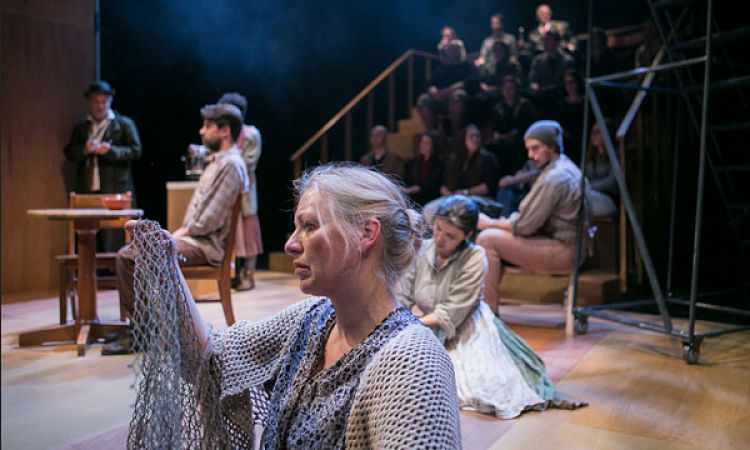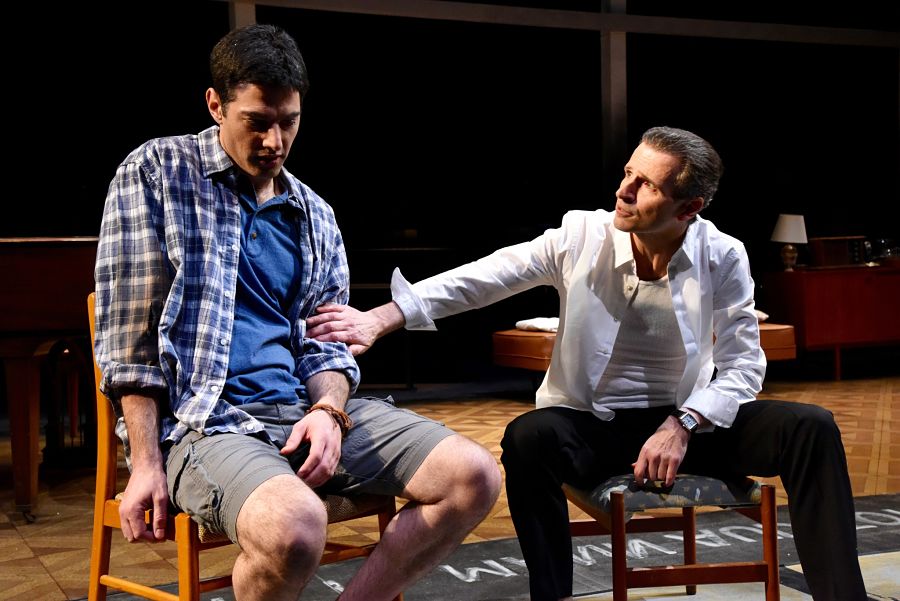Theatregoers in Washington, D.C., were treated to a rare occurrence this spring as two different theatres presented work by two different Israeli writers. At D.C.’s longtime Jewish theatre Theater J, director Derek Goldman helmed his lyrical adaptation of writer and peace activist David Grossman’s novel Falling Out of Time (which ran March 17–April 17), while at Mosaic Theater, founded by ex-Theater J artistic director Ari Roth, audiences could see Motti Lerner’s more realistic After the War (which ran March 24–April 17). Both are written by leftist writers famous in Israel for their pro-peace politics, and both are rooted in the 2006 war in Lebanon. The similarities end there: One is realistic, the other not; one is political, the other not. And it’s hard not to see these contrasts as making a statement about Jewish theatre—and theatre from Israel—in Washington.
After all, Mosaic Theater was founded by Theater J’s long-time artistic director Ari Roth, who left—or was ousted, depending who you ask—from Theater J after clashing with the leadership of the DCJCC. I reported on that story for American Theatre when it happened, but the short version is that Roth left in part because he felt he could not produce plays critical of the Israeli occupation and treatment of the Palestinians, even plays written by Israelis. As reported earlier, the breaking point of his relationship with the DCJCC was an earlier play by Lerner called The Admission, about the uncovering of a massacre during the 1948 war of partition that established Israel as a state.
Now, as part of Mosaic’s first season, Roth again programmed Lerner, whose play is explicitly about the human costs of being a Jew who criticizes Israel. After the War echoes Arthur Miller in more than just its title. Like several of Miller’s plays, Lerner’s entwines the personal and the political within a family tragedy, and is possessed of a Miller-esque animating moral intelligence that sometimes takes priority over dramatic artfulness.
After the War takes place immediately after the Second Lebanon War in 2006. Joel, a world-renowned concert pianist, returns to his childhood home in Tel Aviv, where he is controversial both publicly and within his family due to his decades-long absence from Israel and his habit of publicly criticizing its treatment of the Palestinians. He is there to give a concert, to see his mother, and to find his son Izzy, who is serving in the IDF. His arrival upsets the order of things in his mother’s house—an order that involves Joel’s ailing mother, Bella; his younger brother, Freddie, a macho blowhard enjoying his position as man of the house a bit too much; Freddie’s girlfriend (and Bella’s nurse), Trudy; and Bernard, Trudy’s hapless ex-husband.
Soon, a mysterious atmosphere of dread, reminiscent of Pinter’s The Homecoming, descends on the house. Joel is giving a concert—or isn’t. He’s a brilliant piano player, or maybe not. A building Izzy fired on during the war was filled with terrorists, or it was filled with civilians, or both. Trudy is with Freddie, then with Joel, then maybe back with Bernard. Bella is kind and mean, warm and cold, the world’s greatest piano teacher who refuses to teach anyone. Izzy returns, but there is something wrong with him, and to everyone’s surprise he despises his father.
Joel’s exile in the United States appears, then, to have been an escape from many different traps, or what he sees as traps: the trap of his family, yes, but also the trap of being an Israeli. The very things that make him a brave and outspoken critic of his home nation also make him arrogant, a womanizer, difficult to love. The play flirts with the idea that Joel’s criticism of Israel is mostly motivated by his own repulsion toward his family, and Joel tries over and over again to have it both ways. He tries to buy the house across the street so he can live in Israel half the year, and tries to give a concert even as he speaks out against the war and, eventually, announces a major donation to a charity affiliated with Hezbollah. Joel’s self-aggrandizement and arrogance are also nearly boundless, as he claims that he has great empathy specifically because he is a great artist, and that his talent makes him a better human.
While it has moments of off-kilter comedy thanks to Bernard’s bumbling attempts to ingratiate himself back into Trudy’s life, After the War is shot through with despair. After decades of failed peace talks, the Israeli center stopped holding long ago, both in Bella’s house and in the world of the play. Things are literally and figuratively falling apart, and Joel ends the play humiliated, re-exiled—this time not by choice—and violently assaulted by his own son. Joel can have success and he can have the freedom to speak out against his homeland, but he can’t have both of these and love. Those looking for a fair fight between proponents and opponents of the 2006 war (or Israel’s treatment of Palestinians in general) won’t find one in After the War. As a portrait of the claustrophobia of living within a political order that you oppose, After the War is compelling, if occasionally heavyhanded.

Grossman, the author of the novel on which Falling Out of Time is based, lost a son in the 2006 Lebanon war. But though Grossman is an outspoken peace activist, he largely avoids the subject of the Israeli-Palestinian conflict in his fiction. Falling Out of Time is a lyrical examination of grief that completely eschews politics. Set in a phantasmagoric, quasi-medieval village, the play’s plot, to the extent that it has one, involves a Duke who’s dispatched a Chronicler to observe the residents of a nearby town, including an Elderly Math Teacher, a Cobbler, a married couple, and a Centaur. All share the loss of a child, all are wanderers, either literally or psychically, and all are to some extent lost.
As its title suggests, Falling Out of Time is less about a story or narrative drive (both of which require a sense of, and relationship to, time’s passage) but about characters who are essentially outside of time. The play’s subject the communal and ritualistic sharing in the experience of loss. The script specifies the erosion of the border between audience and performers, and the actors are supposed to regularly wander the aisles.
If After The War is in some ways in conversation with the Jewish American realism of Arthur Miller, Falling Out of Time feels more akin to the work of Yiddish playwright Peretz Hirschbein. There’s also more than a little of the mythical gestures of the Jewish artist and writer Bruno Schulz’s The Street of Crocodiles. These form the background for the script’s main events: a series of poetic lamentations and short scenes with each of the characters. Take this one, where the Woman confronts her husband about how his grief over their dead child has made him absent from their life:
Look at me. No,
Not with that empty gaze.
Stop.
Come back to me,
To us. It’s so easy
To forsake us, and this
Light, and tender
Arms, and the thought
That we have come back
To life.
The text is frequently beautiful, but these speeches, absent any real narrative drive, remain purely poetic instead of dramatic, like a Greek tragedy that is all choral odes. In a way, it’s more like an evening-length piece of music than a play, more image and sound than story and character.
Perhaps beautiful language and pure emotion—which is to say, vibe—are what you’re left with when you decide you won’t discuss politics. To have a plot is to begin to say something about the world. Oedipus, for example, is often read as either about fate or sexual development, but it is also deeply political. It’s a play performed for and by a people who have experienced tyranny wondering whence justice originates, and thus from where it’s missing. It answers that question with the gods, who, in their own somewhat obscure and roundabout way, punish a regicide by the play’s conclusion. To put it ungenerously, the question Falling Out of Time asks is, How does it feel to lose a child? And the answer it provides is: Really bad.
But perhaps it’s exactly this kind of universal recognition of grief, of loss and lost-ness, that fuels the kind of empathic engagement with the world that allows for the repair of it. If we can earnestly say no one should have to outlive their children and actually mean it, perhaps there is hope, particularly a decade after a war in which the vast majority of those killed were Lebanese civilians, many of whom were women and children.
This is, after all, what Joel believes in After the War, as he asks his brother, “Do you really think we don’t need to do anything for children who’ve been burned, blinded, whose limbs have been torn off, whose insides have been shredded?” His brother, like all good Jews, answers this question with another, “Do you really think that after what their parents did to our children there’s anyone in this country who cares about them?” After the War answers this question with outrage and anguish. Perhaps you could say that Falling Out of Time answers it with: Hopefully, yes.


